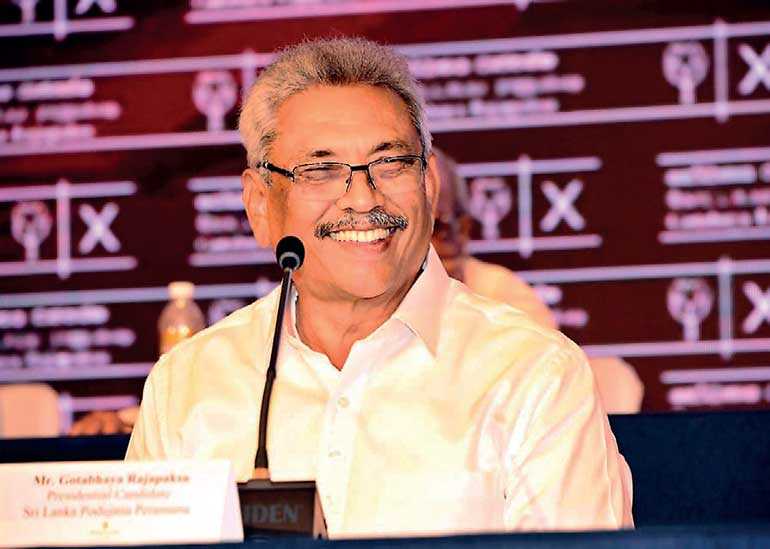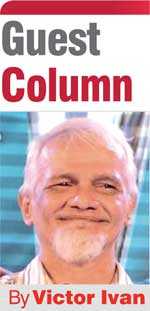Monday Feb 16, 2026
Monday Feb 16, 2026
Friday, 15 May 2020 00:00 - - {{hitsCtrl.values.hits}}

Gradually, Sri Lanka is dragging itself into an abyss without sight of a bottom. The navigators who steer the craft of Sri Lanka or the passengers on board it do not seem to have any idea of the peril ahead. Sri Lanka has become a helpless country, caught in a series of crises that emerged, one after the other. 
The corona crisis broke out at a time when the country’s social and political system and the economy were in dire straits. It has doubled, perhaps trebled the magnitude and the complexity of the crisis Sri Lanka is facing. Yet, the potential of the emergence of some other crises did not end there.
Now there is a constitutional crisis falling on it with a possibility of several other crises breaking out in consequence thereof. It appears that Sri Lanka is becoming an untoward victim of a vicious cycle, prospects of escape from it, is rather remote.
Losing the sense of reasoning
For considerably a long time, the affairs of the country had been taking place in a rather distorted and reckless manner. So much so, the country’s political psyche and that of the society was not in a state of normalcy; the entire system had become deformed. By the time the internal civil war was successfully concluded, Sri Lanka had reached a state of decay and degeneration being unable to move forward, any longer without effecting structural reformations conducive to restructuring and re-creating the country.
The system of governance, the State, institutional and social system was on the verge of collapse. Yet, the party that was in power when the war was concluded and their successors simply played with the crisis without guiding the nation towards structural reforms to solve it. Moreover, both mainstream parties lacked the political wisdom, honesty and integrity needed for that.
Not only the political parties, but also the political leaders themselves were in a corrupt and rotten state. Pillaging of public property had become a regular feature of State rule since 1978. This situation had led to corrupt the entire institutional system. As the exploitation of public property had become the guiding motive of Sri Lankan politics, obviously the political parties were not inclined or rather reluctant to initiate reforms that would inevitably lead to deprivation of power held by them.
The dilemma of expectations
By the time the last presidential election was held, Sri Lanka had reached almost the tail end of this unfortunate historical journey. Everything in the country was happening in a perverse manner. The Easter Sunday attack had terrorised the people of the country frightening them and distorting their minds to maximum.
Gotabaya Rajapaksa who contested the presidential election was able to achieve an easy and  spectacular victory with the exclusive support of the majority Sinhala-Buddhist vote. Not only the country, but the people, the ruling party and the opposition were equally in a state of chaos and a confused mental disposition. There was no match between the expectations of the people who voted for the President and those of the President himself.
spectacular victory with the exclusive support of the majority Sinhala-Buddhist vote. Not only the country, but the people, the ruling party and the opposition were equally in a state of chaos and a confused mental disposition. There was no match between the expectations of the people who voted for the President and those of the President himself.
The public who voted him aspired that the triumphant President will rescue the country from the grip of minority communities and transform Sri Lanka into a more prosperous country and fulfil the aspirations of Sinhala Buddhist people. But, the people who elected the President did not know initially that the latter was only a nominal head of the State and the presidency is a position without executive powers.
Their leader too, had not enlightened them on the true position. The President’s propaganda machinery, in spite of projecting a huge hero image of him over a long period of two to three years, there remained a huge gap between the actual ability of the president and the one created in the minds of the people.
Prior to the presidential election, Gotabaya Rajapaksa must have been living in a very stressful mental atmosphere on account of a number of court cases filed against him with or without justifiable reasons. It was not an issue confined only to him; his brothers and some political friends also had faced a similar situation. So it can be presumed that their main object would have been to seize political power so that they could rescue themselves from the legal implications they had got entangled with.
If Gotabaya Rajapaksa had wanted the power to steer the state rule, what he should have done was to contest and win the post of premiership on which the executive power had been vested by the 19th amendment rather than contesting the presidency which had been deprived of executive power by the same amendment. It cannot be presumed that the changes made in the sphere of presidential powers by the 19th amendment were not known to them.
It was obvious that consequent to the 19th amendment, even a Cabinet Minister is entrusted with more powers than the President. However, Gotabaya may have opted to contest the presidency with the intention of finding relief for himself and his relations and friends from the Court cases which were pending. This narrow objective however did not match with the stated larger purpose of the presidential campaign.
President and the Constitution
In regard to the parliamentary election, the Election Commission appears to be adhering to the election law rather than keeping to the philosophy of the Constitution. The Commissioner of Elections has said that there are others to look after the Constitution and his responsibility will be to act in accordance with the election law. However, it is important to remember that the Constitution is supreme and the election laws should be implemented in accordance with the provisions of the Constitution. Despite having a previous Court ruling pointing out to the Election Commissioner the importance of referring certain issues to the Supreme Court and seeking necessary guidance and directions in difficult situations where the Commission finds it difficult to reach a decision on its own, the Commissioner of Elections had refrained from doing so.
The President also refrained from doing so when he could have consulted the Supreme Court for an interpretation. He also refrained from reconvening the old Parliament and said that he would summon only the new Parliament after the election, but not the old Parliament which stands dissolved at present.
Is it because the old parliament was corrupt that he doesn’t want to reconvene it? Can the new parliament be considered pure and not corrupt just because it is new? It is not difficult to understand that most of the candidates nominated for re-election, and are likely to be elected are without clean hands. It is not clear as to what will be the final judgment of the cases filed before the Court to resolve this crisis.
The President seems to think that he has the power to rule the country until a new Parliament is elected as currently the old Parliament stands dissolved. But such thinking is against the constitution. According to the constitution, in a situation where the parliament is dissolved pending a parliamentary election, the president can rule the country without a parliament only for a maximum of three months. According to the Constitution, the Parliament cannot abandon its supremacy nor can it be transferred to another institution.
Also, the President should not forget the fact that the 19th Amendment has vested him only a nominal power. He should also understand that though he had been elected by popular vote, he is not entitled to more powers than what has been provided for, in the constitution. It must be noted that the Doctrine of Necessity is valid only when there are no other options to choose from. Taking decisions outside the provisions of the Constitution and without guidance of the judiciary is contrary to the Constitution of the country.
Taking decisions contrary to the constitution will not be in the best interest of the country as well as the President. The country is now in a state of near bankruptcy. The sources of government revenue have collapsed substantially. It has reached a level where the government finds it difficult to pay even the salaries of the government servants. If the President’s overarching ambition is to build a healthy and strong country, it is the democratic path that upholds the sovereignty of the people that should be adopted, and not the authoritarian or dictatorial path.